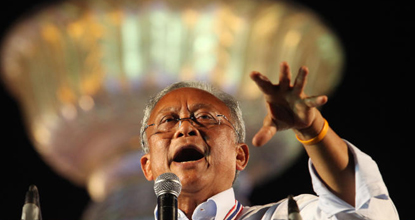
Supreme Commander Tanasak Patimapragorn has agreed to meet with anti-government protest leader Suthep Thaugsuban and hear the People's Democratic Reform Committee's (PDRC) proposals for national reform.
Speaking to demonstrators at the Democracy Monument on Thursday evening, Mr Suthep said Gen Tanasak had agreed to meet him and PDRC core leaders at 3pm on Saturday at the armed forces headquarters.
Mr Suthep said he will try to explain the committee's positions and its national reform proposals to the military leaders, and hopes the military top brass will decide to "stand alongside the people".
The armed forces on Thursday night issued a statement saying the PDRC's request to explain their reform plans would lead to an exchange of opinions that will bring about a peaceful solution.
The armed forces would invite representatives from state agencies, academics and all stakeholders to attend the forum where PDRC leaders would explain its national reform process which would be followed by a Q&A session.
An armed forces source said red-shirt United Front for Democracy against Dictatorship representatives will also be invited to the talks and that Gen Tanasak will act as moderator.
Mr Suthep, the PDRC secretary-general, announced on Wednesday he wanted to meet military leaders, the national police chief, private sector leaders and academics to explain the committee's proposals for national reforms.
The private sector was the first to agree to meet Mr Suthep with both sides meeting on Thursday.
National police chief Adul Saengsingkaew, however, turned down Mr Suthep's request for a meeting.
At the meeting with representatives from seven business organisations on Thursday, Mr Suthep insisted that national reforms must take place and a "people's council" must be in place before a general election.
"National reform must get under way before a general election. There can be no compromise on this. If anyone insists on holding elections beforehand, I will make sure the elections do not take place," Mr Suthep told the businessmen.
He said Prime Minister Yingluck Shinawatra must step down from her caretaker role and must not appoint a replacement, which would lead to a power vacuum. Following these measures would enable pre-election reform processes to begin, Mr Suthep said.
After the caretaker prime minister steps down, the deputy Senate speaker will nominate a new prime minister for royal appointment, Mr Suthep said.
Next, the newly appointed prime minister will issue a royal decree to dissolve the Senate and set up a people's council whose members have no political affiliations. He explained the council would have 400 members, 300 of whom will be representatives from various professions. The remaining 100 will be selected from scholars and well-respected senior citizens.
When the people's council completes its work and ends its role, its members will not be allowed to hold political positions for five years, Mr Suthep said.